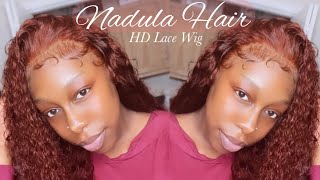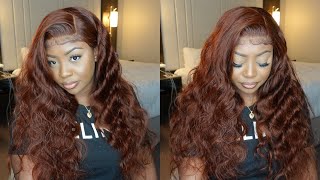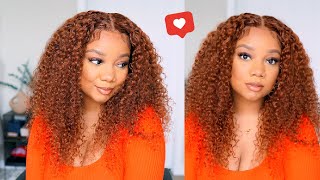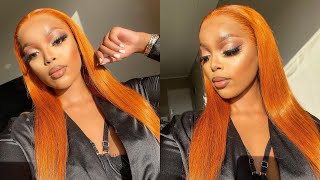The Origin of Ginger Hair: Why Are Redheads Called Ginger?
- Posted on 25 June, 2021
- Hot Topic
- By Kenneth

Chances are you’ve heard someone with red hair called “ginger” at some point. Or conversely, if you have red hair (or ginger hair), you may have become accustomed to the term, willingly or otherwise.
Some redheads embrace and use the term when referring to themselves, while others find it offensive.
Regardless, we all want to know where the term came from, what it really means, and whether we should say it – that’s what we’ll address in this article. So, let’s get started with why redheads are called ginger.
Why Are Redheads Called Ginger?
Nobody knows the true origin of the word ginger. And, while some theories sound more convincing than others, all of them are speculative. In this section, we will look at all the explanations in detail.
Ginger Root, Flavor, and Food
In the first theory, redheads are compared to ginger roots. Why? There’s a stereotype that redheads have a fiery temper, similar to the kick that a ginger root gives to food.
A similar explanation associates red-heads with the reddish tinge in ginger-flavored meals and foods like gingerbread, ginger cake, or ginger snaps.
Gilligan’s Island
Mainstream media is well known for initiating trends and popularizing nicknames, and this has played a part in this widespread use of the word ginger.
The iconic sixties sitcom Gilligan’s Island is credited with popularizing the term ginger. This is because the popular American TV show featured a character named Ginger Grant (Tina Louise), who had red hair and pale skin.
Ginger quickly became enormously popular among Americans and people began calling redheads gingers because they looked similar to Ginger from the show.
South Park
Some people suggest that the term “ginger” became even more popular due to the South Park episode dedicated to the stereotype.
During the episode, the character Cartman has an irrational fear about “ginger kids” and goes on to say that people with red hair, light skin, and freckles have “gingervitus”.
Red Ginger Plant and Other Theories
Other theories suggest that the term ginger was used much earlier. In fact, it was used for the first time in the 18th century, taking its inspiration from a tropical plant called the Malaysian Ginger Plant.
Later on, in the 19th century, the term was used to refer to people with sandy-colored hair, which resembled ginger skin. Over time, the term was used to refer to anyone with reddish-brown hair or bright red hair.
Are the terms “Redhead” and “Ginger” the Same?

If you are like most people, you use the terms redhead and ginger interchangeably. To most of us, they mean the same thing, with ginger being the slang term for redheads.
However, some use the terms “ginger” and “redhead” differently, stating that redheads have more reddish tones, while gingers have brownish-orange tones.
Also, ginger is often used to refer to people born with red hair and pale, freckled skin, while redheads may include natural redheads or anyone who chooses to dye their hair red.
The meanings of these terms often overlap in the real world, and regardless of the actual meaning, people still use them interchangeably.
Is It Rude to Call Someone Ginger?
It can certainly be rude to call someone ginger, and that’s because of the fact that some people will be offended by it. Different people with red hair have different opinions about the word.
Some embrace the word and use it when referring to themselves, some find it offensive, and others don’t hate the term but prefer not to be called ginger.
Some Red-Headed People are Against the Term
Most people who prefer to be called redheads rather than ginger focus on how the word has been used over the years. The most offensive memories are probably from the UK, where redheads were demeaned, bullied, and abused.
In addition, red-haired people have encountered some bullying and stigmatization with the term used alongside it.
Such people would rather be called redheads than ginger, particularly by non-red-haired people who don’t know what it’s like to have walked in their shoes.
Some Don’t Mind Much
You will also come across redheads who don’t love the term but don’t find it offensive either. In that case, the term might bother them when it comes from a stranger but maybe not from a friend or fellow redhead.
Some Like the Term Ginger Hair
The last type of redheads don’t find the term offensive, neither are they bothered by its use. They use the term to refer to themselves, especially when interacting with other redheads.
Ed Sheeran, one of the most famous redheads, actually has a record label called Gingerbread Man Records and says his red hair has contributed significantly to the success of his music career.
Reasons Why You Shouldn’t Call Someone Ginger

While not everyone uses ginger in a malicious way, the term carries more of a negative connotation than “redhead,” affecting individuals differently. In this section, we’ll look at several reasons why you shouldn’t call someone ginger.
Ginger is Objectifying
One of the reasons you should refrain from calling a redhead ginger is because the term can be objectifying.
Even though some amount of a person’s identity comes from their hair color, it is not the only thing that defines them. There is more to them, just like any other group of people.
Ginger is Divisive
Not every redhead likes the term. Just because there is a nickname for redheads doesn’t mean that they all like it.
Some will find it offensive, especially if you don’t know them personally and don’t have their permission. People stigmatized using the term may never grow to accept it, so it’s very personal.
It Generalizes
Accepting the use of the term ginger could also mean accepting the stereotypes that come along with it, like gingers having an aggressive temper.
Just because people have the same hair color, that doesn’t mean they are similar in other ways, and this is one thing that irritates redheads most.
It is Recognized to be Offensive
If you take a look at the Merriam Webster dictionary, you’ll find this definition: chiefly British, sometimes offensive: a person with red hair. The definition acknowledges the derogatory nature of the word.
It Reopens Wounds
Calling someone ginger may reopen old wounds. Most people with red hair have been bullied at some point in life, especially in school. Movies also show red-haired kids as targets for bullies as they are very noticeable.
Anyone who has been bullied may always associate the term with such memories and hate it forever. When you call them ginger, you remind them of the past from which they may not have healed.
So, refraining from calling someone ginger is a no-brainer, especially if you don’t have their permission. Because of all the negative connotations, history, and effects of using the word, it’s better not to use it.
Is Redhead Any Better?

Now that you know that ginger is one of those words you may want to avoid, let’s get into the alternative. Redhead is much more widely used, especially in recent times, to refer to someone who has red hair.
Its use is right on par with how we call dark-haired people brunettes or blonde-haired people blondes.
Since “redhead” doesn’t carry the offensive connotations that “ginger” does, we recommend using the term redhead when referring to people with red hair. The term redhead is used in a descriptive way rather than a derogatory way.
Fun Facts
Red hair is found naturally in about one to two percent of the world’s population, but it can be found more often in people with Northern or Northwestern European heritage.
Ireland is the country in Europe with the highest percentage of those with red hair at around 10%. Great Britain also has a high number of redheaded people. In Scotland, the percentage is about 6%.
Some of the world’s most popular celebrities have red hair, including Nicole Kidman, Benedict Cumberbatch, Laura Prepon, Seth Green, Bridget Regan, Carrot Top, Julia Roberts, Thomas Jefferson, Ginger Rogers, and Emma Stone.
Conclusion

Although there is no universally accepted explanation for the origin of ginger’s use and how it relates to redheads, several theories seek to explain the mystery.
Over the years, individuals with red hair have been subjected to puns and jokes due to their hair color, freckled skin, and overall “different” appearance.
We are well aware that what you call people is your choice, but if you’d like to consider the full picture, redhead is a much better word to use than ginger.
We hope that this article was helpful to you, giving you the information you need to inform your decision-making on this matter.




